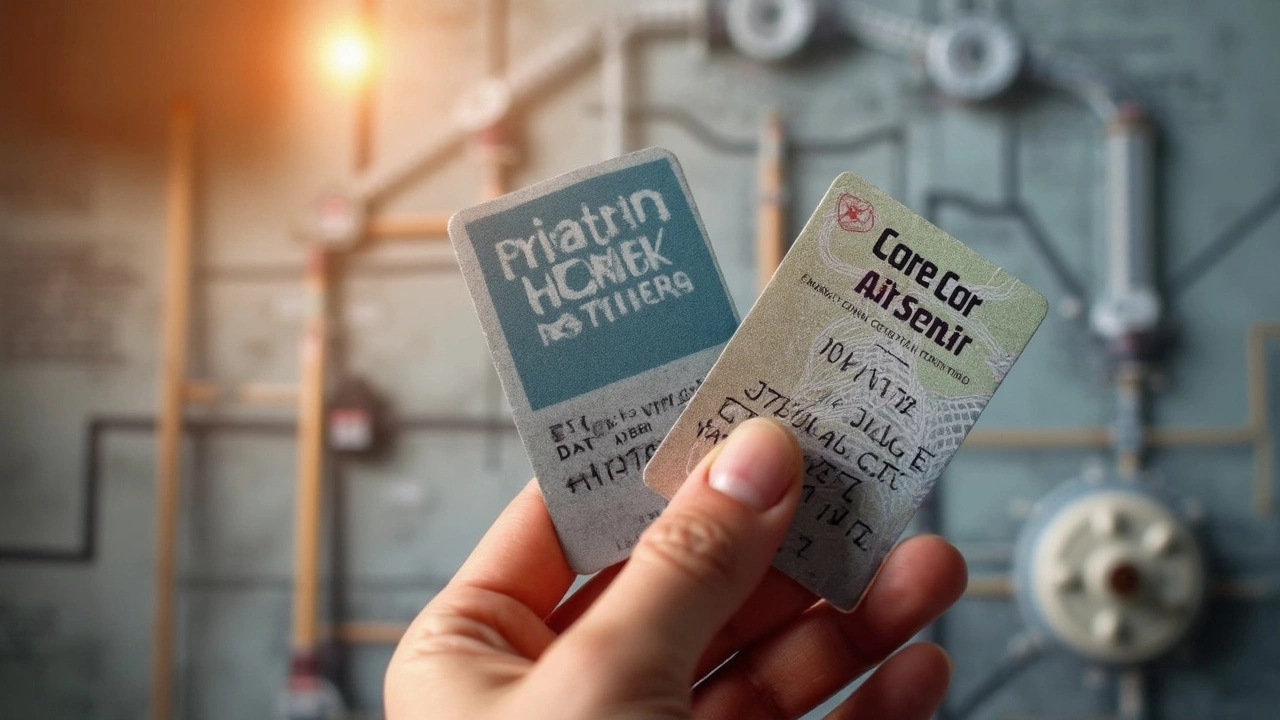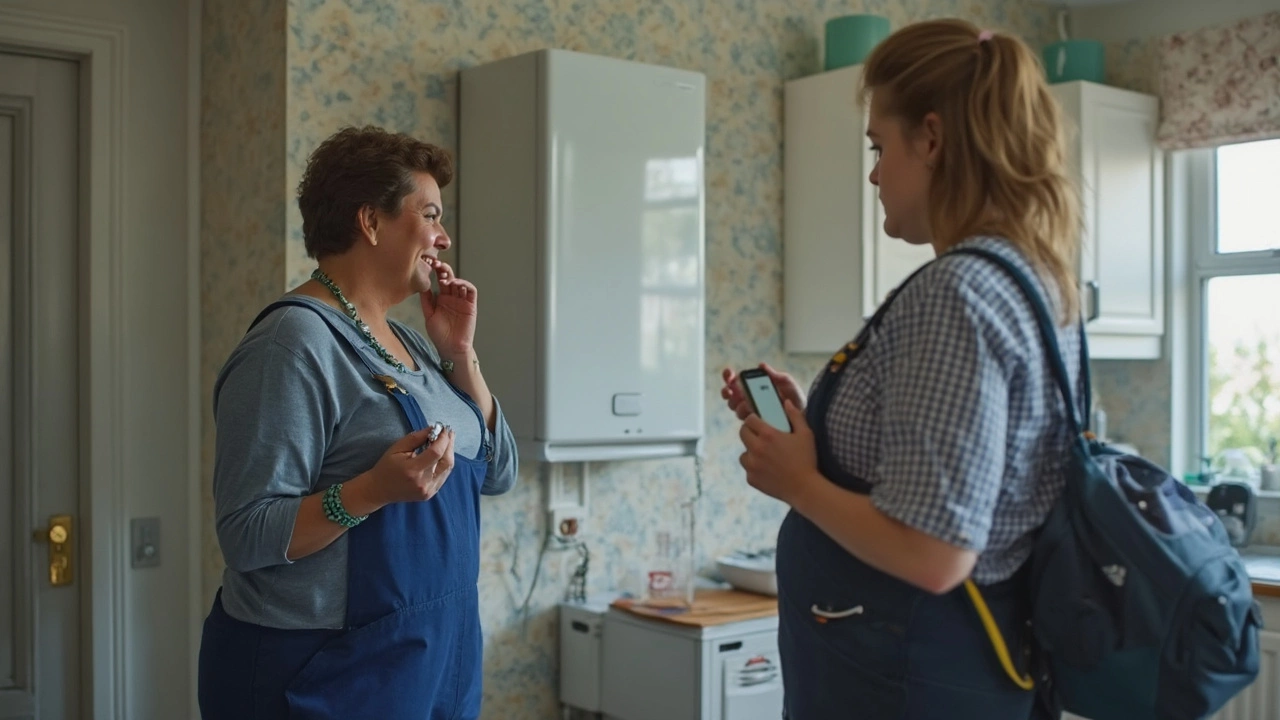If your boiler’s on the blink, the first thing that pops up is—do you call a plumber, or is that the wrong move? This confusion trips up a lot of people, and honestly, sometimes even the trades guys aren't clear about it.
Here's the short answer: not all plumbers can legally or safely fix a boiler. Boilers deal with gas, and playing around with gas when you’re not trained is a one-way ticket to disaster. In the UK, for example, only a Gas Safe registered engineer is allowed to work on gas boilers. If someone can't show you that little yellow badge, let them walk.
But it’s not all black and white. For certain jobs—like fixing pipes that connect to the boiler, swapping out a radiator valve, or dealing with leaks—a plumber is totally fine. It's when you get inside the boiler, tinkering with heating elements or anything gas-related, that's when you need the real pro.
Fun fact: there’s a big difference between a plumber with lots of experience and a qualified heating engineer. Some heating engineers started out as plumbers but went on to do extra training so they’d be legal to work on boilers. Always ask them what certificates they've got, and don’t be shy about it. It’s your safety on the line.
- Plumbers vs Heating Engineers: What's the Difference?
- What Boiler Jobs Can a Plumber Actually Do?
- How to Check if Someone is Qualified to Fix Your Boiler
- Tips to Avoid Boiler Repair Disasters
Plumbers vs Heating Engineers: What's the Difference?
Most folks assume if someone’s a plumber, they automatically know how to sort out a boiler. Truth is, it doesn’t really work that way. Plumbers and heating engineers both work with pipes and water, but their training and what they’re legally allowed to do is very different—especially when you throw gas and boilers into the mix.
A regular plumber handles stuff like fixing leaky taps, sorting blocked sinks, and repairing toilets. They’re experts with water systems, but not really with gas or anything that heats your house. If you’ve got a burst pipe or need a new shower installed, your average plumber is your guy.
Heating engineers, on the other hand, focus on stuff that gets the house warm: boilers, radiators, and heating controls. If you have a gas or electric boiler repair job, a heating engineer is the one with the right badges and training—especially in countries like the UK, where they need to be Gas Safe registered. These engineers do extra training for gas safety work, which isn’t a requirement for all plumbers. That registration isn’t just paperwork; it’s the law.
Here’s a quick comparison to show what’s what:
| Job Type | Plumber | Heating Engineer |
|---|---|---|
| Unclogging drains | Yes | Sometimes |
| Fixing radiators | Basic repairs | Yes, full system work |
| Gas boiler servicing | No | Yes (with Gas Safe registration) |
| Pipes and water leaks | Yes | Yes |
| Boiler installation | No | Yes (certified only) |
If you let a regular plumber near your gas boiler’s inner workings, insurance might not pay out if something goes wrong—and you could be putting your safety at risk. Never hurts to double check: ask them what their qualifications are, and don’t just take their word for it. In my house, Lydia always makes sure we see the Gas Safe card before anyone touches our boiler. It only takes a second, but it’s a big deal.
What Boiler Jobs Can a Plumber Actually Do?
Not every issue with your boiler means you need a specialist straight away. Some jobs are squarely in a plumber’s wheelhouse, and calling them saves time and money.
Here’s what a plumber can handle without any fuss:
- Fixing or replacing external pipework leading to and from the boiler—like that leaking copper pipe under your stairs.
- Bleeding and balancing your radiators. If your heating system’s getting warm unevenly, a plumber’s often all you need.
- Swapping out radiator valves if they’re jammed or worn out.
- Helping with central heating system flushes, provided they don’t need to touch the inside of the boiler itself.
- Dealing with leaks in the central heating system or general plumbing issues that happen around your boiler.
But—and it’s a big one—plumbers hit a hard stop as soon as the work involves gas. That’s the law in the UK, and honestly, it’s the right call. Anything inside the boiler casing, changing the boiler itself, or fiddling with gas lines is off-limits unless they've got the right certification.
"If you need any repair or installation work inside the actual boiler, or with any gas supply, a Gas Safe registered engineer must do it. Even just checking gas pressure requires special training." — Gas Safe Register spokesperson
It’s worth noting: some plumbers have dual qualifications. Just because someone hands you a plumbing business card doesn’t rule out that they’re also a registered heating engineer. Still, always check for credentials.
Here’s a quick comparison between plumbers and Gas Safe engineers for common heating jobs:
| Job | Plumber | Gas Safe Engineer |
|---|---|---|
| Repair leaking pipe to boiler | Yes | Yes |
| Bleed radiators | Yes | Yes |
| Replace radiator valve | Yes | Yes |
| Faulty boiler ignition or burner | No | Yes |
| Annual gas boiler service | No | Yes |
| Fixing gas leak | No | Yes |
If you’re not sure, ask upfront. It saves both sides a headache if you ring the right pro for the job.

How to Check if Someone is Qualified to Fix Your Boiler
If you want to keep your home safe and your wallet happy, you’ve got to be sure the person repairing your boiler actually knows what they’re doing. Way too many people just trust the first bloke who shows up with a toolbox—bad idea.
First off, if your boiler runs on gas (most do), the main thing you need to see is a Gas Safe registration. In the UK, this is the law. No Gas Safe card? You absolutely shouldn't let them near your boiler. That card isn’t just a piece of plastic—it means the engineer’s been properly trained and passed strict tests. You can even check their number online on the Gas Safe Register for extra peace of mind.
- Ask to see their Gas Safe ID card in person. Don’t just take their word for it. On the card, look for the engineer’s photo, registration number, and the list of jobs they’re certified for.
- If you’re in Ireland, you need a RGI (Registered Gas Installer) and in the US, check for state licensing and, with some boiler brands, manufacturer approval.
- For electric boilers, you’ll want someone certified with NICEIC or a similar group—these guys are trained for electrical systems, not just water pipes.
Always ask if they’ve got recent training on your specific boiler repair needs. Boiler tech changes fast—nobody should be working on a ten-year-old qualification. If the engineer seems annoyed by your questions, that’s a red flag. The good ones never mind showing proof and talking through how they’ll keep things safe.
If you’re using a local plumbing company, check their reviews online. Bad reviews usually mean others have already run into problems. A bit of googling can save you from a cold shower—or much worse.
Tips to Avoid Boiler Repair Disasters
Let’s talk about keeping things safe—and your wallet, too. The most common mistake people make with their boilers is trying to fix more than they know how. You’d be surprised how often a simple call could have saved buckets of stress.
- Check credentials every single time. Boiler repair should not be a guessing game. Always ask the person coming to your house if they’re Gas Safe registered. You can even check their ID badge. It shows their photo, a start and expiry date, and exactly what kind of work they’re qualified to do.
- Never skip annual servicing. Boilers need a yearly check from someone qualified, not just when something’s broken. Regular servicing stops problems before they get expensive and even keeps your warranty intact with most manufacturers.
- Watch out for cheap offers. If a repair quote sounds too good to be true, it probably means corners are getting cut or the person isn’t certified. Trust me, paying for proper boiler repair up front costs less than dealing with a gas leak or a failed inspection later.
- Don’t let anyone touch the gas. If someone tries to fix or open up your gas boiler without showing proof they’re Gas Safe, ask them to leave. This isn’t being rude—it’s about not risking gas leaks or carbon monoxide, which is deadly and totally invisible.
- Pay attention to small signs. Is your boiler making odd noises, losing pressure, or giving off a weird smell? Even tiny leaks around your unit are worth calling a pro about. Spotting things early stops bigger disasters down the line.
- Keep manuals and info packs. Having your boiler’s manual handy makes life easier when a pro shows up. Details like make, model, and service history are gold for faster, safer repairs.
Lydia and I learned our lesson once when we tried to save a few quid by letting a ‘handyman’ take a peek. Never again. Play it safe and stick with the real pros—your home and heating are worth it.

I am an expert in the services industry with a focus on appliance repair. My passion lies in understanding how things work and educating others in simple, engaging ways. This enthusiasm fuels my writing, where I delve into topics around appliance maintenance and troubleshooting. I aim to make these subjects clear and accessible to all readers.